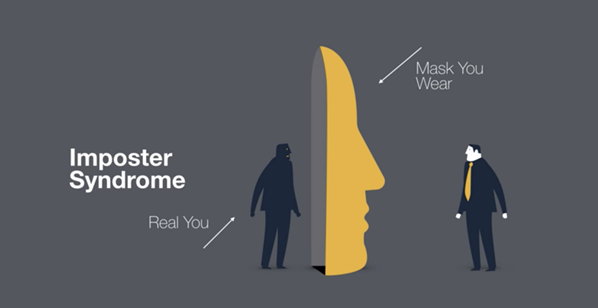Definition
Imposter syndrome is a psychological occurrence where a person doubts their requirements, credentials, skills, talent, accomplishments, wealth, or family name to carry out a certain activity like learning, presenting, fulfilling a task or a project at work, promotion, titles, starting a business, writing a book, asking someone for a date or being a parent, etc.
Around 25 to 30 percent of high achievers may suffer from imposter syndrome, and around 70 percent of adults may experience imposterism at least once in their lifetime, research suggests.
The term imposter phenomenon was introduced in an article published in 1978, titled “The imposter Phenomenon in High Achieving Women: Dynamics and Therapeutic Intervention” by Pauline R. Clance and Suzanne A. Imes. Clance and Imes defined imposter phenomenon as “an internal experience of intellectual phoniness” and initially focused their research on women in higher education and professional industries.
The researchers surveyed over 100 women, and approximately one-third of them were involved in psychotherapy for reasons besides imposter syndrome while two-thirds of them knew from their own lectures and therapy groups. All of the participants had been formally recognized for their professional excellence by colleagues and displayed academic achievement through educational degrees and standardized testing scores. Despite the consistent external validation these women received, they lacked internal acknowledgement of their accomplishments. When asked about their success, some participants attributed it to luck, while some believed that people had overestimated their capabilities.
Causes of Imposter Syndrome

You may say that Cinderella, from the famous fairytale, had imposter syndrome due to the fact she was lowborn which was exacerbated by the treatment she was dealt with by her stepmother and half-sisters who basically turned her into their housemaid.
From Cinderella’s tale, it can be appreciated that identity or basically how a person views self and the stories one tells oneself plays a key role towards one’s place in the social hierarchy whether it is academic, work setting, romantic, friends, and community. If the story you tell yourself or identity misaligns from your status, it predisposes you to negativity within your psyche and damages your self esteem which can manifest in a wide range of emotions and behavior.
Why does it occur more often in women than men? According to the aforementioned research, according to a lot of psychologists, the big 5 personality traits could be the main reason why it occurs. People who are high in neuroticism or emotional instability are highly sensitive to threats compared to other people. If you are high in neuroticism you have a pessimistic outlook about situations i.e. what is the worst case scenario if I fail to accomplish this task then I am going to lose my job, the respect of my colleagues, never get married, get ostracized, or lose my status. Women have been found to have higher levels of neuroticism especially from adolescence onwards, It’s believed that it’s an adaptive behavior considering the role they play as mothers who have the life of babies in their hands.
According to Sigmund Freud, the superego is part of our psyche which reflects the internalization of cultural rules, mainly as absorbed from parents, but also other authority figures, and the general cultural ethos of consciousness. A superego attack is when that voice is overcritical and judgmental on every step of ours due to unsuccessful integration of the superego which ends up crashing the ego anytime a person intends to try out a new activity or a challenge.
Lastly, there seems to be a correlation between imposter syndrome and guilt, which could be as a result of expectations from family from a young age when the kid shows potential and gets labelled with words like genius, smart, intelligent, the good one, our favorite kid. This creates a burden of expectations from a young age and as growth occurs the reality about the world becomes vivid leading to loss of self-entitlement since everything is achieved through hard work and not potential.
Therapy for Imposter Syndrome
The first question to ask is that is imposter syndrome something abnormal, my answer to that is not really, any time a person tries doing something never done before, and there is always an uncertainty in the mind whether it is conquerable or not. And as such this is seemingly a normal attribute of life however It seems that the only way out of it is by achieving small goals, which builds up confidence for harder tasks, and even in case of failure if you fail at that task you know that you have already succeeded once so you try again and again till you succeed because you aren’t a failure but rather failed at one task.
Talking to a mentor wouldn’t only validate how normal this phenomenon is but that one can overcome it and be like that person if only there is perseverance, the glory lies just beyond this obstacle.
Any task which is worth pursuing has to make a person feel incompetent, and that is where the excitement and expectations lie, what is called the optimal experience or flow by the psychologist Mihály Csíkszentmihályi, A mental state in which a person gets fully immersed and actively enjoys the task at hand. It’s the state of finding a balance between competence and how challenging that task is. If a task is too easy there are many attributes of boredom and while, if the task is too hard there is a lot of fear, so flow is the sweet spot where we lose track of time and feel a sense of accomplishment.
Therefore in conclusion, Imposter syndrome has the potential of stopping a person from trying out new things due to the fact that you are the first person from a family, village or even country to climb the social ladder without no known role models hence be representing more which tends to propel a greater feel of pressure to be perfect which in most cases becomes more likely to cost one’s success.
However, the only way out of it is to accept our predicament and even take pride in it while becoming the best role model for our youth and using that as a fire to outcompete our colleagues who come from a better backgrounds.
Do you have a story or an opinion to share? Email us on: dailyexpressug@gmail.com Or follow the Daily Express on X Platform or WhatsApp for the latest updates.
The writer; Sande Elison Oundo, is the President of Vigilant Living, a counseling and coaching company.

